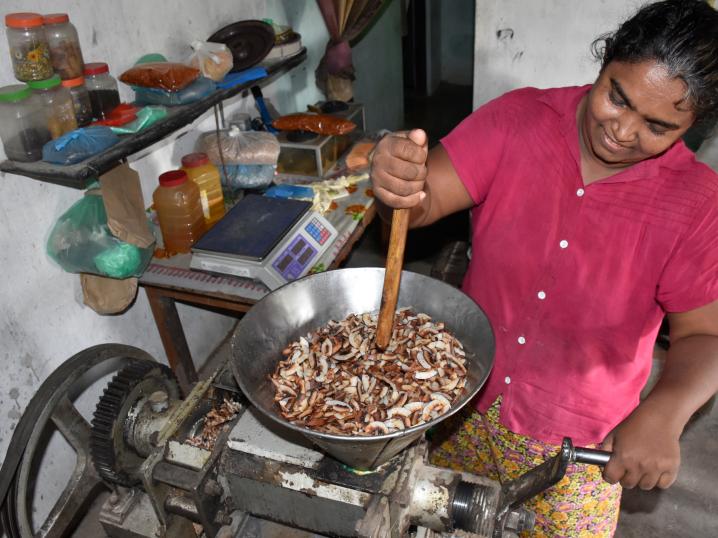Farming for the Future

Agriculture remains the main occupation for many families in Sri Lanka, including in the north-western district of Puttlam, where Chandrani (42 years) and her husband Sarath call home.
They are farmers; cultivating paddy, coconut, bananas, sesame and various vegetables. The roof of their home is partly made out of thatched coconut leaves, and their garden houses a large well that provides water to the vegetation, as well as the hundreds of groundnut (peanut) plants that their dog Mickey loves to run through. The front room of their house serves as a grinding mill.
This is their second home. The previous one, situated right next to their paddy fields and comprising of just one room, used to get flooded every time it rained. Now it serves as a lookout point for Sarath each night as he keeps watch to chase away the elephants that come to eat the crops.
They have two children; their son Nipun (22 years) is involved in drilling wells, while their daughter Chathurika (17 years) is still in school, studying agriculture technology.
Every day, after school, Chathurika joins her father in the paddy fields, helping him by carrying pails of water and fertilizer. The fields are about three miles away from their home. She now rides their motorcycle down the dusty winding roads with her pigtails flying in the wind to go to the paddy fields and to school. She recalls walking to school with her brother every morning cutting across paddy fields and during the rainy days they removed their shoes to keep them from getting wet as they trudged through the flooded fields.
Chathurika now attends a bigger school in town but since her mother started suffering from a severe spine ache, Chathurika has been doing all the housework: washing clothes, cooking and helping customers that come to the mill.
Microfinance loans from VisionFund provide timely support to agriculture-dependent families like Chathurika’s. Her mother, Chandrani, has received seven loans to date for purchasing a spray tank and fertilizer, hiring help to work the fields during the harvest, building their well, and setting up the mill.
They purchased their first grinding machine in 2008 with a loan of about $435. But it remained unused for two years as they only received electricity to their house in 2010. Now the mill has 3-4 machines and customers come in throughout the day to access the mills; to cut up copra, extract coconut oil, grind chillies, flour, barley and coffee.
The mill room has a cement floor while the rest of the house is made up of mud-thatched floors and walls, and a thatched roof. While they have many small sources of income, they still need the financial support that the loans provide. Chandrani’s immediate plan is to pay off her existing loans and finish building their house. She also wants to ensure that her daughter’s education is supported so that Chathurika can attend university and get a good job.